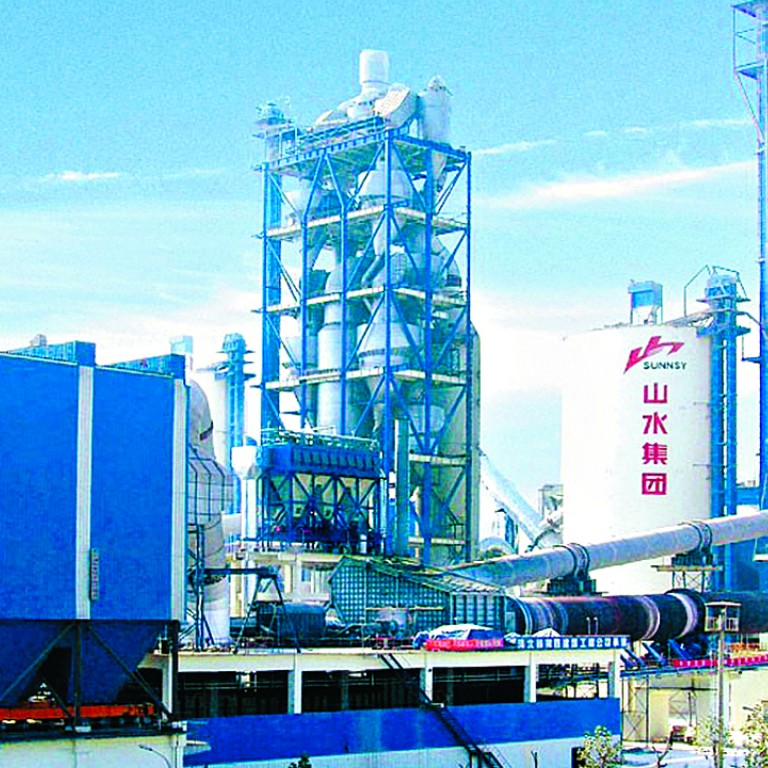
China Shanshui Cement subsidiaries sue mainland Chinese mayor and deputy for conspiracy in Hong Kong court
Jinan mayor Yang Luyu and deputy Su Shuwei are accused of trying to take control of property assets, business and staff
The mayor of Jinan (濟南) and his deputy from the northern province of Shandong (山東) have been sued in a Hong Kong court over an alleged conspiracy relating to assets belonging to the subsidiaries of a debt-laden mainland cement company. But the lack of local ties from the parties might suggest the rare case could end up being a publicity stunt rather than a legitimate legal battle.
China Pioneer Cement (Hong Kong) Company and Shandong Shanshui Cement Group Company – subsidiaries of the Hong Kong-listed China Shanshui Cement Group – are suing Jinan mayor Yang Luyu and his deputy Su Shuwei over an alleged conspiracy with their former directors, according to a court writ filed on Friday.
This essentially means that the plaintiffs are suing two mainland officials for allegations which took place on the mainland. One of the plaintiffs, Shandong Cement, is also a company incorporated across the border.
This raised questions as to how court documents could be served and court decisions enforced across two jurisdictions, a lawyer and legal scholar noted.
“Normally, if the event takes place on the mainland, there is no use issuing the writ in Hong Kong,” said barrister Albert Luk Wai-hung, who suggested an act as such could be artificial.
READ MORE: China Shanshui Cement defaults on 1.8 b yuan bond
According to the writ, Yang and Su conspired with Zhang Caikui and his son Zhang Bin, the two former directors, to install “a so-called working group” in the plaintiffs’ Jinan plant on December 7 last year.
In doing so, they sought to “take control of [China Pioneer Cement] group’s property assets, businesses and staff held through Shandong Cement”, the writ claimed.
Further allegations include that around the same time, Yang and Su conspired with the two directors to conceal Shandong Shanshui’s company seals and litigation records, while obstructing the plaintiffs’ attempt to gain access to the Jinan plant concerned, the writ alleged.
The writ also claimed the unlawful conspiracy caused Shandong Shanshui to publish false information, saying that the two Zhangs and a man called Chen Xueshi were still the directors, while in fact new directors had been appointed.
Explaining the legal procedures involved, Luk said for a civil case to commence, the plaintiffs must first serve a bundle of court documents on the defendants.
But in this case, the documents would have to be served to mainland residents.
University of Hong Kong legal scholar Eric Cheung Tat-ming said the plaintiffs could either use an official channel, via the Hong Kong courts or assign their own mainland lawyers.
The former, as stated in the Basic Law, involves the plaintiffs handing the documents over to the Hong Kong courts, which would then pass them to mainland courts for service .
Cheung, who said the system was reliable, added: “I am not sure whether it would be another story serving [documents] to a mayor.”
Cheung also said the plaintiffs had first to satisfy the local courts under High Court rules, before accessing the channel.
The rules state that the injunction a plaintiff seeks should be within Hong Kong’s jurisdiction.
But the two subsidiaries are seeking injunctions for Yang and Su to produce property – ranging from company seals to litigation records – relating to the plaintiffs, without specifying whether all the properties sought are in Hong Kong.
Luk added unless the mayors had been fully informed, any court decisions would not be legally binding even if the court proceeded and ruled in the plaintiffs’ favour.
If the mayors were not in Hong Kong, Cheung said, they would not be held accountable even if they had breached any injunctions the court granted.
The plaintiffs also demanded that the court restrain Yang and Su from publishing anything stating that the two Zhangs and Chen are lawful directors of Shandong Shanshui. They asked the court to award them damages, to be assessed.
The lawsuit is the culmination of a corporate battle for control of China Shanshui – the country’s seventh largest cement maker.
Tianrui Group, which started a hostile takeover of China Shanshui last April and replaced its entire board in December, has been in a year-long brawl with ousted ex-chairman and founder Zhang Caikui and his son Zhang Bin for control of the company’s assets, including its official seal and website.
China Shanshui has not traded since April last year as the proportion of shares held by the public was below a 25 per cent limit.
CLSA analyst Daniel Meng said the fight for control in the past year has severely affected the running of a company, which started off with a top-notch performance.
He believed the current legal fight would be good as the parties in dispute were resorting to legal means to resolve their differences.

